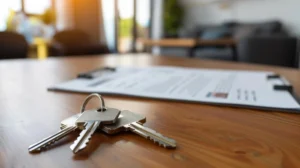Buying a home in Spain isn't just about choosing your dream property and signing the deed: it involves assuming a series of costs and taxes that, if not calculated properly, can throw your financial plans off balance.
Whether it's a centrally located apartment, a coastal chalet, or a luxury villa, understanding the costs involved when buying a home in Spain is key to avoiding surprises.
On average, you should set aside between 10% and 15% on top of the purchase price. Let's take a closer look at what this amount includes and how to pay for it.
Expenses for purchasing a home
From taxes to notary fees, registration fees, administrative fees, and, if applicable, the mortgage, let's look at the expenses included in the purchase of a home.
1. Taxes: ITP or VAT, and AJD
📌 Second-hand housing: ITP
When you buy a used home, you pay the Property Transfer Tax (ITP). It ranges from 6% to 10% of the sales price, depending on the autonomous community. For example:
- Andalusia: 7%
- Valencian Community: 10%
- Madrid: 6%
For luxury properties, the tax base is higher, so the tax bill rises considerably. A penthouse in Madrid worth €2 million carries a property tax of €120,000.
📌 New housing: VAT and AJD
For brand new housing you pay VAT, which is 10% of the purchase price, plus the Tax on Documented Legal Acts (AJD), which ranges from 0.5% to 1.5% depending on the community.
Example:
- New villa for €800,000 on the Costa Blanca:
- VAT: €80,000
- AJD (1.5%): €12,000
- Total taxes: €92,000
- VAT: €80,000
2. Notary: your purchase in writing and validated
The notary drafts and authorizes the deed of sale and, if applicable, the mortgage. Fees are regulated by law and depend on the declared price:
- Standard apartment: €600 – €1,200
- Luxury villa: easily €2,000 or more, depending on the complexity of the transaction (several properties, annexes, usufructs).
In luxury homes, many buyers choose to include usufruct agreements, wills, or family pacts in the deed itself.
3. Property Registry: legal guarantee
Once the deed is signed, it must be registered. This step protects your ownership rights against third parties.
- Estimated cost: €400 – €1,000, depending on the value and number of entries.
- Properties with adjoining properties (garden, parking, storage room) generate additional annotations.
4. Agency: avoid surprises with the Treasury
If you purchase with a mortgage, the agency will handle the taxes, register the mortgage, and register the property.
- Average cost: €300 – €600
- Complex transactions (holding companies, several rural properties): €1,000 or more.
5. Appraisal: How much is your house really worth?
Mandatory if you finance the purchase with a bank. It helps determine the real market value.
- Standard housing: €300 – €500
- Luxury housing: €800 – €2,000, if there are unique features.
In luxury homes, it's common to commission several appraisals to negotiate a mortgage or plan your taxes.
6. Mortgage opening commission
It does not always exist, but many banks charge 0.5% to 1% of the capital lent.
- Mortgage of €500,000: €2,500 – €5,000.
- In high-value villas, where the mortgage can exceed 1 million, this commission skyrockets.
What do I have to pay if I buy a house?
If we summarize all the direct expenses for an individual, this is what you pay:
✅ Taxes: ITP or VAT + AJD
✅ Notary and Property Registry
✅ Agency (if there is a mortgage)
✅ Appraisal (if there is a mortgage)
✅ Opening commission (if there is a mortgage)
Practical example:
- Second-hand apartment: €200,000 in Valencia
- ITP 10%: €20,000
- Notary: €800
- Registration: €500
- Total expenses: ~€21,300 (plus mortgage if applicable)
- ITP 10%: €20,000
- New luxury villa: €2,500,000 on the Costa Blanca
- VAT 10%: €250,000
- AJD 1.5%: €37,500
- Notary: €3,000
- Registration: €1,500
- Premium consulting and management: €3,000
- Total expenses: ~295,000 € (without mortgage)
- VAT 10%: €250,000
Recurring expenses and taxes: after the purchase
IBI (Property Tax)
Annual municipal tax calculated on the cadastral value.
- Normal apartment: €200 – €800 per year.
- Premium villas: €2,000 – €10,000, depending on location and terrain.
Community of owners
If you buy in a building or development: cleaning, security, garden and pool maintenance costs.
- Urban apartment: €50 – €200/month
- Villas in a luxury development with a social club, security, and sports areas: €400–€1,000/month.
Municipal Capital Gains Tax
The seller usually pays it, but it can be agreed that the buyer will assume it. It taxes the appreciation of urban land since the last transfer.
Insurance
Mandatory if you have a mortgage. Always recommended.
- Average apartment: €150 – €300/year.
- Luxury villa: €1,000 – €5,000/year, for art, pool, gardens.
How can expenses be paid?
Mortgage or cash payment?
- If you buy in cash, you pay all expenses out of pocket before or at the time of the deed.
- If you buy with a mortgage, banks only finance between 70% and 80% of the purchase or appraisal price; the rest comes from your savings.
- The purchase and sale expenses and deeds They are also not usually included in the mortgage.
Therefore, it is recommended to have between 30% and 35% of the total price saved for entry and expenses.
Alternatives to reduce costs
- Negotiate purchase price: The higher the price, the higher the tax. Sometimes it can be adjusted if furniture or accessories are paid for separately.
- Review tax exemptions: Some communities offer discounts for people under 35, large families, or subsidized housing.
- Specialized advice: Essential for high-net-worth individuals and foreign buyers. Proper planning avoids surcharges and optimizes your tax situation.
Does the same apply to foreigners?
Yes, but with nuances:
- Non-residents: If your tax residence is not in Spain, you have additional obligations: declaring assets abroad and considering Wealth Tax if you exceed the regional limits.
- Golden Visa: Investing more than €500,000 in unencumbered properties allows you to apply for investment residency.
Therefore, when searching luxury homes for saleIt is essential to have professionals who are familiar with both Spanish law and double taxation agreements.
Ways to buy a property in Spain
When it comes to buying a home in Spain, many people think only of paying cash or a mortgage, but there are several options tailored to different buyer profiles and types of homes. Each option has its own tax, financial, and legal implications.
Let's see them:
✅ Cash purchase
- The simplest way: the buyer has the 100% of the amount plus expenses.
- Ideal for those who have liquidity or are selling another property.
- Very common among foreign buyers looking to avoid banking complications.
- In luxury homes, it is used to streamline the transaction and increase negotiating power.
Advantage: Savings on mortgage interest and fees.
Inconvenient: You need big savings and pay all your expenses at once.
✅ Purchase with a mortgage
The most common option for domestic buyers and foreign residents with income in Spain.
- Banks finance between 70% and 80% of the purchase or appraisal value (whichever is lower).
- The buyer must pay the down payment and the purchase costs (10%-15% extra).
- Interest rates can be fixed, variable or mixed.
- In premium villa transactions, banks study the buyer's ability to pay more closely.
Advantage: Allows you to purchase without completely losing your capital.
Inconvenient: Initial appraisal, opening commission, and management fees increase.
✅ Real estate leasing (financial leasing)
Less common for individuals, but interesting for self-employed workers or SMEs:
- It is a financial lease with an option to purchase at the end of the term.
- Widely used in commercial premises or offices.
- Allows you to deduct fees as an expense if you purchase through a company.
Advantage: Tax flexibility for businesses.
Inconvenient: It is not usually applied to primary residences, but rather to business assets.
✅ Off-plan purchase (in-place)
- Buying off-plan or in-progress means purchasing a home that is still under construction.
- A deposit is paid and partial payments are made during the work.
- The remainder is paid upon delivery of the property.
- Very common in new coastal developments or luxury residential areas.
Advantage: Purchase price is usually lower than a finished home.
Inconvenient: Risk of delays or non-compliance by the developer (which is why guarantees and warranties must be verified).
✅ Purchase with deferred payment or seller financing
- In some transactions (especially villas or high-value properties), the seller accepts split payments.
- A payment schedule and delivery of possession are agreed upon in a private contract.
- It may include guarantees such as a mortgage in favor of the seller.
Advantage: You avoid bank mortgages.
Inconvenient: Normally, the final price tends to be somewhat higher due to private financing.
✅ Housing cooperatives
Another formula, very widespread in cities:
- A group of buyers organizes to build.
- Payment is made as the work progresses.
- Construction risk and bureaucratic management are assumed.
Advantage: More reasonable prices.
Inconvenient: Less flexible deadlines, risk of delays and collective management.
So what's the best way for you?
- Foreigners with liquidity: Cash payments streamline procedures and reduce bank charges.
- Local buyers or residents: A mortgage is usually the most balanced option.
- Tax-minded investors: Buying off-site or through a company can optimize taxes.
- Entrepreneurs: Real estate leasing or cooperative may have specific advantages.
Before deciding, it's a good idea to compare all the options with a specialized advisor and real estate attorney. This way, you can adjust your budget and protect your investment.
And if you're looking for exclusive options on the Costa Blanca, explore the best selection of luxury homes for sale with the help of experts who will guide you through every step, from the most advantageous payment method to the delivery of the keys.
Where to find trusted advice?
The expenses in purchasing a home are inevitable, but well-planned management makes the difference between a stressful transaction and a safe investment. Whether you're looking for a villa with sea views or a centrally located apartment for teleworking in the sun, let local experts guide you. Explore the best selection of luxury homes for sale and trust a team that helps you understand each expense item before signing.


